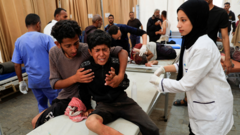Tehran, Iran's capital, stands currently at a crossroads between fear, anger, and a longing for peace. Residents express their confusion over the violence that has escalated after Israeli military operations, fearing both the loss of their city and the repercussions of foreign intervention.
**"Residents of Tehran: A City Under Siege Amidst Conflicting Emotions"**

**"Residents of Tehran: A City Under Siege Amidst Conflicting Emotions"**
Tehran's citizens recount their fears and confusion as Israel's military strikes intensify, revealing deep-seated complexities in their sentiments towards the regime and foreign intervention.
"I haven't slept for nights," says Donya, a 21-year-old music student, feeling torn between the threat of violence and a deep dislike for the Iranian regime. Many people in Tehran, surprised by the swift attacks from Israel, describe the harrowing scenes of long queues at petrol stations and bakeries as citizens try to escape the chaotic atmosphere.
The emotional landscape is complex; some residents initially felt a strange exhilaration at seeing powerful Iranian officials targeted, only to shift towards deep sorrow and anger as civilians began to perish. Over 220 individuals, many women and children, have reportedly been killed in air raids since Friday, with Iranians reflecting on their role in the conflict.
Unlike Israel, where sirens warn of incoming missiles, Tehran finds itself in a state of confusion without such alerts. Reports of car bombings further instill panic within the city. Donya recalls a time when she defied strict dress codes, but now she avoids leaving her home out of fear, resorting to medication to help her sleep. The government’s alternative suggestions for safety, like seeking refuge in metro stations or mosques, only amplify feelings of precariousness as missile attacks leave many feeling defenseless.
"We check the news every hour," expresses another young woman, echoing the sentiments of many as they navigate through fears for their lives, unsure of where safety may lie. The weight of uncertainty transforms daily life, as every individual grapples with shifting perspectives about the Iranian regime and the current conflict.
The Israeli strikes have also drawn sharp divisions within Iranian society, deterring many from a cohesive stance against the regime. Conversations reveal families torn between differing views on the attacks, leaving Iranians to think critically about the implications of foreign military action on their pursuit of freedom.
"Everyone's life, whether they supported the attacks or not, has been changed forever," one woman poignantly shares, highlighting a collective awakening among Iranians to the realization that liberation cannot stem from foreign bombardment.
As members of the Iranian diaspora express their heartbreak for those suffering, both currently in the homeland and abroad, the pressing concern remains: “What will happen next?” The fear of turning into a war-torn nation like Iraq or Syria looms large, as ordinary Iranians grapple with their circumstances amidst a blend of sorrow and helpless anxiety.






















